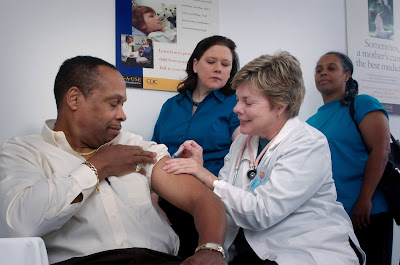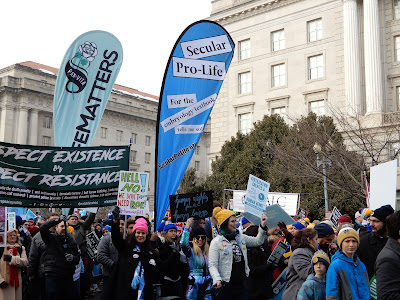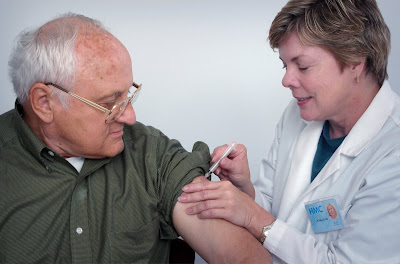Pro-Life Perspectives on Abortion-Tainted Vaccines: Part 1
Editor’s Note: Many readers have asked us about the ethics of receiving vaccines that were developed in part by exploiting the bodies of abortion victims. In this post, guest author Stacy Trasancos outlines factors to be considered in confronting this dilemma. In part 2, coming Friday, Secular Pro-Life president Kelsey Hazzard will offer her thoughts.
There is a logical angst that goes with being pro-life in a country where abortion is legal. In the United States, an estimated 3,000 unborn children are killed in abortion clinics daily. A pro-life person might wonder why she is not running into those buildings and demanding that it all stop, the same way she would fight like hell if two-year-old toddlers were being systematically killed by an industry. Yet, Americans live in a pluralistic society where almost half the population thinks it is acceptable for a mother to kill the unwanted child in her womb. Pro-life advocates know they must find peaceful ways to cause change, so their reality is that merely living daily life in a country with legal abortion feels like manifest hypocrisy.
Nothing, however, brings that cognitive dissonance home like making a decision about using a vaccine whose existence depends on the use of cell lines derived from an aborted child. Instead of wondering about abstract laws and clinics in another part of town, the choice impacts the pro-life advocate individually. Our own health, our immediate families, and our communities are affected by the decision we make.
One might wonder, then, can you be pro-life and receive an abortion-tainted vaccine? If doing so is not, itself, inherently immoral, such as making the decision to murder someone, then the decision becomes a matter of informed conscience.
This is called discernment. Think of it like an equation. There are variables that go into the decision, and each variable has different coefficients and powers. In the calculus, the factors that affect your decision will be weighted differently depending on your specific circumstances during any given period. The good news is we have the freedom to think and make choices. The bad news is that discernment is not easy when the decision is complex. At times, it can be heart wrenching.
The person making the decision about vaccines is not at fault, in the moment, for the fact that he or she may be presented with only vaccines produced using fetal cell lines and no other alternative. She did not ask to be in this position. She never consented to the abortion that occurred, no matter how long ago or far away it happened. She is simply trying to keep herself, her family, and her community safe, which is a good intention. The weight applied to these variables differs.
Health. Are you already immunocompromised? Are you elderly? Are you at risk? Is someone in your family at risk? Or is it likely that you would tolerate the virus well? Do you have access to medicines to alleviate the duration of the viral infection?
Vocation. Are you a caregiver? Are you a medical professional or healthcare worker? Do you work in close contact with a lot of people? Does your family depend on you to go to work? Could you lose your job for refusing to be vaccinated?
Location. Do you live in a place where the virus is already rampant? Can you effectively maintain social distancing measures? Can you move about with a mask and six feet distance between you and everyone else not in your bubble? Do you live in the country or the city?
Timing. Can you wait for an ethically produced vaccine? Are there ethically produced vaccines coming? Will you have access to ethically produced vaccines where you live? Do your local health care providers work to gain access to ethical vaccines?
Impact. There can many more variables, but there is one I want to argue that pro-lifers should weight heavily. I propose that we seriously consider how our choice will affect the community and nation.
A person making a decision about using an abortion-tainted vaccine may not be at fault for the immediate set of options in the moment, but every person’s choice does impact the market, and therefore affects the decisions of industries, university researchers, and government agencies going forward, however small.
“Yes, I will accept a benefit even though it depends on the use of an aborted child.”
“No, even if it makes my life more difficult, I will not accept this vaccine.”
We cannot draw an imaginary boundary around ourselves either temporally or spatially. About half of Americans consider themselves pro-life, which is about 164 million people. It is, therefore, an objective and mathematical fact that if even a quarter of those people (41 million) demanded the availability of ethically produced vaccines with no connection to any aborted fetal cell line in development or production, then the scientific, academic, industrial, and governmental communities would be compelled to accommodate that stand. In time, if even a smaller fraction of the pro-life community refused such vaccines, ethically produced vaccines (and other medicines) would appear in the market.
In this sense, pro-life advocates do share some remote responsibility in the choices available to us. If we know the stakes that factor into our decision now, then we know those decisions will affect the future situation. And, true to the adage that ignorance is bliss, we cannot excuse our obligation as pro-lifers to make choices that build a more just civilization for the children of today.
We may not be able to storm into an abortion clinic and shout a protest to save those babies being killed by abortion. Some of us may legitimately need an available vaccine for safety. But we can — and should — choose to accept some risk and discomfort if at all possible when faced with an abortion-tainted vaccine.
Stacy Trasancos has a PhD in chemistry and was senior research chemist at DuPont. She has an MA in dogmatic theology and is now chief research officer for Children of God for Life and executive director of St. Philip Institute for Bishop Joseph Strickland in Tyler, TX. Stacy has seven children and six grandchildren.




Leave a Reply
Want to join the discussion?Feel free to contribute!